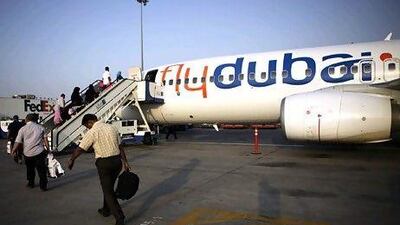Dubai's budget airline plans to tap demand for winter sun and sand from Russian tourists.
Flydubai is planning a major foray into the country and neighbouring Ukraine with five new routes next month.
The expansion, an unusually heavy focus on one region for a budget airline that flies throughout the Middle East, Africa and South Asia, underscores the high demand for the UAE's sun-and-sand holidays for residents of eastern Europe and Russia.
Tourism will serve as a "launching pad" for the flights, said Ghaith Al Ghaith, the chief executive of flydubai, who said next month's launch date was timed to coincide with the start of the winter travel season.
The UAE competes against Egypt and Turkey for tourists from this region, he said. "These routes are mainly targeting tourists coming into the UAE. But the services will also cater to business traffic." The new services starting up next month include Kiev, Kharkov and Donetsk in Ukraine, and Kazan and Ufa in southern Russia. Flydubai already operates two other services to Russia, to Samara and Yekaterinburg.
The services are the latest in the airline's steep growth path, which includes flying a total of 40 destinations in just over two years, targeting markets such as Djibouti, Armenia and Azerbaijan.
Although the Middle East is home to some of the world's largest international carries, southern Russia and Ukraine have limited connectivity with the Gulf. Emirates does not have any services to the region, although the Sharjah-based Air Arabia serves Kiev, and Etihad uses a code-share arrangement to fly to the Ukrainian capital, as well as operating its own services to Minsk, in neighbouring Belarus.
In the wider eastern European region, Qatar Airways flies to Tbilisi, Baku and Bucharest.
Flydubai was spreading the risk of flying to three destinations in one country by servicing each Ukrainian city just twice or three times weekly, Mr Al Ghaith said.
"We are tied up in a way that pretty much guarantees a certain level of business to ensure all routes will be successful from day one," he said.
The designation of Ukraine as a co-host for the Euro 2012 football championship, a major tournament that attracted 1.1 million spectators when it was last held in 2008, would help to boost flydubai's operations next summer.
The airline was also planning to market the flights to UAE residents seeking a taste of the region's antiquated charm and its historic palaces and churches, said Mr Al Ghaith.

